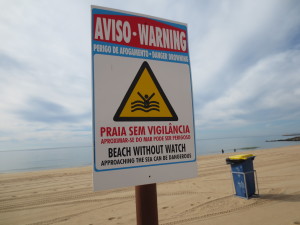Before arriving to their destinations, study abroad students are advised that homesickness (of varying degrees) is an inevitable part of the study abroad experience. It makes sense: all of a sudden you are thrown into a new life with new people and, in my case, a language that you don’t speak very well. It can be a difficult adjustment.
I really am enjoying myself here, but I’ve encountered in the last week or two a new kind of frustration regarding the language and culture barriers. When I first arrived to Seville, it was a funny for me when I stumbled through conversations with my host parents and was able to share humorous misunderstandings with my American friends here. But 6 weeks in, I often get tired of not being able to express myself in Spanish. Even the simplest messages, like “I’m not feeling great today” or “I can’t finish all of this food,” lose the nuances of kindness and respect that I would be able to add in English. I would hate to come off as rude to my host parents and I hope they can tell by my tone of voice and facial expressions that I appreciate what they do for me.
Other things are made difficult with my limited knowledge of the language. What I affectionately refer to as my “stupid little phone,” the cell phone I have to make calls to people in Spain and which looks like it was yanked straight out of 2001, is testy and sometimes won’t make a call or send texts messages, even though I am pretty sure I paid for minutes. When I went to the phone store once to recargar, or to recharge my minutes, I could not understand the employee who was trying to explain to me why I had depleted my phone credits so quickly. The phone is working for now but it could go any day without notice. Or maybe it is okay! I truly have no idea.
My vocabulary in Spanish is limited, so I don’t feel like I can always express accurately how I feel about something or what my views on a particular topic are. I find myself with often ending a sentence in the middle of a thought and telling my host parents “No tengo las palabras”–I don’t have the words. I get frustrated because when I like something or think something is good, the only thing I really know how to say is “Esta bueno” or “Me gusta,” even when my feelings are more complex than that.
I write this not to scare off you potential study abroad students, but to tell you that there are times when you will feel down and to hopefully provide an example for how to work through the tough times when you are away from what is familiar and comfortable. Muster up some of that Penn State pride you feel so strongly when you are at school, and use it to power through your frustration and confusion. Keep doing things with people and living life the best you can. I hope as I continue writing this blog I can share with you how I cope with some of the difficulties abroad. It’s important to recognize that they do happen, but also that they don’t have to interfere with your international experience unless you let them.
To balance out the melancholia of this post, here’s a funny picture of a sign I found in Portugal. “Approaching the sea can be dangerous.”
Location: Seville, Spain
Loading map...




I already understand the frustration you had/ are having with not being able to communicate your thoughts to native speakers. I also have that struggle of not knowing and remembering vocabulary so my sentences are pretty simple but I think you’ll pull through! Think of it this way, you’re doing a whole lot better than if I was with you since I don’t remember any Spanish from high school!